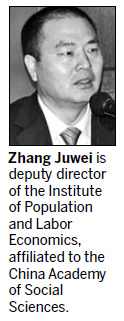Labor market is imbalanced
Many Chinese cities have made it a practice to hold two separate recruitment fairs simultaneously - one for college graduates, the other for migrant workers. But the dividing line between graduates and migrant workers is no longer as clear as before. At a recent recruitment fair for migrant workers in Rizhao, Shandong province, more than 50 percent of the applicants were graduates. Similar cases have been reported from many other cities.

With jobs getting scarcer, an increasing number of graduates have taken up jobs that don't require a college diploma. Earlier, such jobs used to be taken up only by migrant workers. The latest survey of the All-China Federation of Trade Unions (ACFTU) shows that about 20.4 percent of the migrant workers have a college diploma. The percentage is even higher, 25.3, among the younger group.
This trend reflects the imbalance between demand and supply in the country's labor market and will continue for some time, says Zhang Juwei, a professor at and deputy director of the Institute of Population and Labor Economics, affiliated to the China Academy of Social Sciences.
"The largest group of graduates who have taken up jobs that don't require a college diploma has become blue-collar workers," says Zhang, who has been studying the labor problems in the country for a long time. "Many other graduates have entered simple service sectors like security and housekeeping."
Disproportionate availability of jobs across industries is the prime cause of the trend, he says. The number of students graduating from colleges multiplied from 3.3 million in 2005 to 5.59 million in 2008. The graduates generally are employed in service sectors and work at office.
Though there are no data on the precise nature of jobs that migrant workers with college diplomas do, the ACFTU survey shows 81.7 percent of the second-generation migrant workers work in the second industry such as manufacturing and 18 percent in the third or services industry. This indicates young migrant workers constitute the main labor force in the second industry, and according to some reports, more graduates are entering the construction sector, which is part of the second industry.
Zhang says the country's relatively backward economic structure and inferior position in the world industrial chain is the cause of this imbalance. China's economic growth has relied heavily on the second industry, which accounts for about half of the total economic output, while the third industry accounts for only about 40 percent, much lower than in most developed countries.
 0
0 






